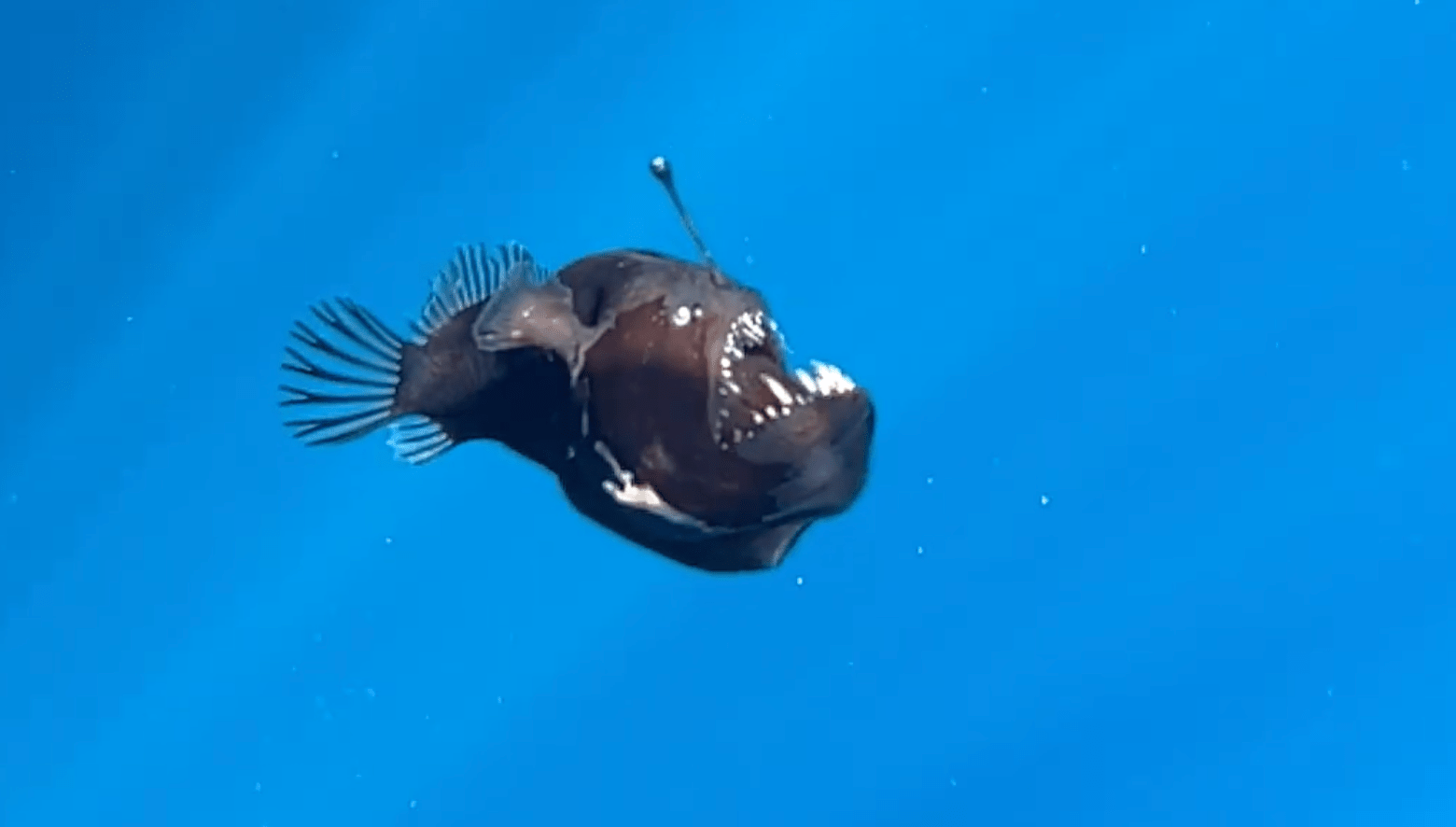She does not fear the darkness. She does not love it, either, mind you; may as well ask her to have an opinion on water! The darkness is all she knows, all she has ever known, all she might have ever known. It is home. If you can see her, it is too late for you. Or, on her final journey, just in time.
She is Melanocetus johnsonii, the humpback anglerfish, the black seadevil. She appears demonic enough to deserve the nickname: a gaping maw that opens almost fully vertically; jagged, needle-sharp teeth, like something out of an ancestral nightmare; the instinct and the appetite to attack and consume anything unfortunate enough to fall into her trap, even if it is larger than she is. But she is no devil. She is a living thing, one that like any other has carved out a way to survive, in a place you might think nothing could. She is a marvel.
There, thousands of feet down, away from the air and the light, she sits and she waits. She waits for her mate, a tenth of her size, to smell her in the dark across the many miles, and then she never sees him again. She waits for life-giving oxygen, and changes her own metabolism to avoid using it when it is scant. But mainly, she waits to feed.
She sits there, where no light reaches, and she makes her own light. She casts her line, and on its end is a bulb occupied by a bioluminescent strain of bacteria. This arrangement works for both of them. The bacteria gain nutrients as she swims, and she gains a lure.
Her lure is a beacon in the black, where she may or may not be lonely, but she is never alone. Even in the depths, life persists. That life is drawn to her light, for reasons it may not understand. Anything living down there has never seen light. It has never seen. The novelty may be enough to draw it near; its curiosity enough to doom it. It comes to the light, and she strikes. And her light goes out until it is time to hunt again.
Her own light is all she has. Her entire world is the few inches in front of her face. This goes on, day after day, year after year: to know only the darkness and ever the darkness, and to pierce it in order to survive. She is the lightbringer of her world; no piscine Prometheus, she brings it to steal life, not to give it.
What is the void to her? Is it safety? Is it a prison? Is it the womb, or a holy immanence, or inky madness? Is it something to be treasured or endured? Is it everything, or is it nothing?
No one knows how long is allotted to her in our seas, but her relatives can live for decades. And perhaps, at the close of her long life, she changes. Perhaps she senses her body failing, and a curiosity grows in her. Perhaps she wants to know, to see, what there is beyond the darkness. After all, there will be an eternity of darkness at the end. But before that...
She swims upward. Hundreds, thousands of feet up. She does not know how she knows which way is up, nor what lies there, but something drives her. Her last energies propel her. These waters are not her home; she could not live here. But she does not intend to live. She merely needs to see.
The darkness changes. Slowly, at first. It becomes less—itself. It is as if the glow of her lure has escaped, spread out over the entire sea. Unlike her lure, it is not threatening, nor compelling. It simply is. And as she rises, it glows stronger, overpowering the dark for good. Now she can make out other, dim shapes in the glow. Her lure would be useless here. She discards it, as she prepares to discard the rest of her body. Up here, there is so much life. The blackness, the moment-to-moment uncertainty, the hope that something will stumble into your path, or the fear that you will stumble into something's ... all gone. All is illuminated. It is beautiful, and so is she.
It is a white pinprick she sees above, at first. Like something on the other side of a veil she can never pierce. It is a bulb that grows stronger, brighter as she rises, though no larger, as if no amount of swimming could bring it closer. It is this, she realizes, that casts the glow all about her, that has turned the blackness to blue. (What is "blue"? she muses, distantly. This is blue.) She rises. Her eyes hurt. She prepares to discard them too. She no longer needs them where she is going. She swims toward the bulb, her strength flagging. She thinks, maybe it is a lure like her own. She wonders, just before the whiteness engulfs her, if this is what her prey saw and felt, if her lure offered them the peace this one offers her.
She does not fear the darkness. But before the final darkness—the light!
On Jan. 26, a team of marine researchers witnessed and filmed a humpback anglerfish near the surface of the ocean off the Canary Islands. It is believed to be the first time this species has been recorded in such shallow waters, and researchers speculated the fish was ill or injured. Biologist Laia Valor said "it was in poor condition and only survived for a few hours."






